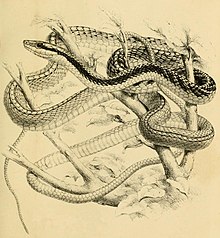| Leptophis diplotropis | |
|---|---|

| |
| Original illustration by G.H. Ford in Günther, 1872 | |
| Conservation status | |
 Least Concern (IUCN 3.1) | |
| Scientific classification | |
| Domain: | Eukaryota |
| Kingdom: | Animalia |
| Phylum: | Chordata |
| Class: | Reptilia |
| Order: | Squamata |
| Suborder: | Serpentes |
| Family: | Colubridae |
| Genus: | Leptophis |
| Species: | L. diplotropis |
| Binomial name | |
| Leptophis diplotropis (Günther, 1872) | |
| Synonyms | |
| |
Leptophis diplotropis, commonly known as the Pacific Coast parrot snake, is a species of snake in the family Colubridae. The species is endemic to Mexico.
Geographic range
The geographic range of L. diplotropis in Mexico extends from southwestern Chihuahua and southern Sonora to southeastern Oaxaca.
Description
Dorsally, L. diplotropis is green (which fades to blue in alcohol) with black and white striping. Ventrally, it is white. Males may attain a snout-to-vent length (SVL) of 90 cm (35 in) plus a tail length of 51 cm (20 in). Females, which are smaller, may attain 73 cm (29 in) SVL plus a 37 cm (15 in) tail. It has on average 19 maxillary teeth, of which the rearmost two are strongly enlarged.
Subspecies
There are two recognized subspecies, including the nominate race.
- Leptophis diplotropis diplotropis (Günther, 1872)
- Leptophis diplotropis forreri H.M. Smith, 1943
Nota bene: A trinomial authority in parentheses indicates that the subspecies was originally described in a genus other than Leptophis.
Etymology
The subspecific name, forreri, is in honor of Alphonse Forrer (1836–1899), an English-born collector of zoological specimens in Mexico for the British Museum.
Habitat
L. diplotropis is found in tropical dry forest, semi-deciduous forest, mangrove forest, oak forest and wet forest, from sea level up to 1,600 m (5,200 ft). It is a highly adaptable species, which is also found in disturbed areas.
Behavior
L. diplotropis is diurnal and mostly arboreal.
Diet
L. diplotropis preys predominately upon frogs (genera Agalychnis, Lithobates, Smilisca, Tlalocohyla, Trachycephalus) and lizards (genus Phyllodactylus).
Reproduction
L. diplotropis is oviparous.
References
- ^ Ponce-Campos, P.; García Aguayo, A. (2007). "Leptophis diplotropis ". IUCN Red List of Threatened Species. 2007: e.T63840A12721094. doi:10.2305/IUCN.UK.2007.RLTS.T63840A12721094.en. Retrieved 20 November 2021.
- Boulenger GA (1894). Catalogue of the Snakes in the British Museum (Natural History). Volume II., Containing the Conclusion of the Colubridæ Aglyphæ. London: Trustees of the British Museum (Natural History). (Taylor and Francis, printers). xi + 382 pp. + Plates I–XX. (Leptophis diplotropis, pp. 110–111).
- ^ Oliver JA (1948). "The Relationships and Zoogeography of the Genus Thalerophis Oliver". Bulletin of the American Museum of Natural History 92 (4): 157–280. (Thalerophis diplotropis, pp. 207–211).
- ^ Species Leptophis diplotropis at The Reptile Database www.reptile-database.org.
- "Leptophis diplotropis ". Integrated Taxonomic Information System. Retrieved 8 May 2011.
- Beolens, Bo; Watkins, Michael; Grayson, Michael (2011). The Eponym Dictionary of Reptiles. Baltimore: Johns Hopkins University Press. xiii + 296 pp. ISBN 978-1-4214-0135-5. (Leptophis diplotropis forreri, p. 92).
- ^ Escalante-Pasos, Jorge Armín; Olguín-Hernández, Licet; Vernouillet, Alizée; Verdugo-Molina, Javier Edgar; López-Castillo, José Ramón (2017). "Leptophis diplotropis (Günther, 1872). Diet". Mesoamerican Herpetology 4 (2): 433–435.
Further reading
- Günther A (1872). "Seventh Account of new Species of Snakes in the Collection of the British Museum". Annals and Magazine of Natural History, Fourth Series 9: 13–37. ("Ahætulla diplotropis", new species, pp. 25–26 + Plate VI, figure A).
- Heimes P (2016). Snakes of Mexico: Herpetofauna Mexicana Vol. I. Frankfurt am Main, Germany: Chimaira. 572 pp. ISBN 978-3899731002.
- Smith HM (1943). "Summary of the Collections of snakes and crocodilians made in Mexico under the Walter Rathbone Bacon Traveling Scholarship". Proceedings of the United States National Museum 93 (3169): 393–504. ("Leptophis diplotropis forreri, new subspecies", p. 443).
| Taxon identifiers | |
|---|---|
| Leptophis diplotropis | |
This article relating to Colubrinae is a stub. You can help Misplaced Pages by expanding it. |
- IUCN Red List least concern species
- Leptophis
- Endemic reptiles of Mexico
- Reptiles described in 1872
- Taxa named by Albert Günther
- Sonoran–Sinaloan transition subtropical dry forest
- Sinaloan dry forests
- Jalisco dry forests
- Fauna of the Southern Pacific dry forests
- Fauna of the Sierra Madre Occidental
- Colubrinae stubs